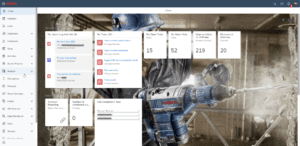Sharing data between the sales, marketing and customer service departments can create a fuller picture of a customer’s needs. And that can lead to a more customer-focused approach and unearth new sales opportunities and engender deeper customer loyalty.
Achieving that goal, however, is not easy, since many departmental databases are siloed, which prohibits digitally sharing customer data across departments. Even if a supplier shares paper reports on customer data between departments, requiring each department to manually rekey that information in its database is time-consuming and labor-intensive.
Robert Bosch Power Tools started to improve data-sharing between departments more than a year ago, but it accelerated the process once the coronavirus pandemic hit earlier this year and caused its monthly customer service requests to spike 50%.
Bosch sells to consumers, or DIYers, as well as businesses through multiple channels, including log-in portals for Bosch dealers and for distributors. It also lets customers link from BoschTools.com to such third-party ecommerce sites as Grainger.com, ToolNut.com and InternationalTool.com.
In recent years, Bosch has been upgrading its ecommerce platform and expanding its online channels. A part of Germany-based Bosch Group, Bosch Power Tools operates in North America as Robert Bosch Tool Corp., based in the Chicago suburb of Mount Prospect, Illinois.
Skyrocketing customer service requests
With customer service requests skyrocketing, Bosch realized it needed to provide its service agents with complete digital access to customer profiles. Its goal: give service agents access to customer information they might not otherwise have to better service the customer.

Marcel Mueller, product owner of CRM, Robert Bosch Power Tools
“Well before the coronavirus pandemic, we saw a need to create a better customer experience by becoming more data-driven to better service our core B2B customers, as well as B2C customers, which we saw was an emerging channel,” says Marcel Mueller, product owner of sales and service CRM for Robert Bosch. “But in the five months since the coronavirus hit, we are handling about 3,000 monthly service requests. We quickly learned we could not continue managing service requests the old way of having service agents manually categorize service requests, many of which are by email or inbound call, so they can be routed to the right agent.”
Achieving its goal of making customer profiles available to service agents meant breaking down inter-departmental data silos. As a result, Bosch Power Tools opted to use the CRM application within its business operations software suite from SAP SE. “As a company, our strategy is to use SAP tools to better service and engage with our customers through one platform,” says Mueller.
Resolving customer issues
The decision to provide service agents instant access to customer profiles was based on the fact that customer service requests vary widely from modifying an order to requesting product content, and everything in between.
Without the ability to digitally access a customer’s profile to see the latest order or what marketing materials they have received, for example, the service agent fielding the request is essentially flying blind, Mueller says.
Armed with a customer’s profile, the service agent can instantly see the most recent order form, invoice and open service requests to immediately identify what information is needed to resolve the issue, or which service agent can best handle the inquiry.

Customer sales and service information on a Bosch Power Tools CRM application.
For example, a service agent fielding a customer request about the status of a prior service request, can call up the customer’s profile, find the open service request and learn its status, then promptly provide the customer an update, Mueller says. If the customer has a question about an invoice, the service agent can call up the invoice and speak knowledgably with the customer about his concerns. If a customer needs to add to or delete from an order, the service agent can locate the order to accommodate the request.
Assisting cross-sells and upsells
Service agents can also access customer profiles to fill in any blanks in the data, such as a customer’s email address, which the marketing department can use for future marketing campaigns. When the customer interaction is completed, service agents can add any relevant notes about the interaction to further fill out the customer profile.
In some cases, a customer service interaction can unearth an opportunity to upsell or cross-sell products to a customer, Mueller says. That information can be entered into the CRM database and forwarded to the sales representative handling the customer’s account.
“Service agents don’t just get relevant customer information out of our CRM, they also add to it,” says Mueller, who adds the same goes for the sales and marketing departments.
In the future, Mueller says, Bosch Power Tools is looking at ways to use its CRM database to deliver relevant content to customers through social media. The company is already doing so through its internet search marketing strategy.
“We are still in the early stages of our transformation to a data-driven company, but the better we can share data inter-departmentally, the better we can understand our customers,” says Mueller. “The better we can understand our customers, the better we can service them.”
Peter Lucas is a Highland Park, Illinois-based freelance journalist covering business and technology.
Sign up for a complimentary subscription to Digital Commerce 360 B2B News, published 4x/week, covering technology and business trends in the growing B2B ecommerce industry. Contact editor Paul Demery at [email protected] and follow him on Twitter @pdemery.
Follow us on LinkedIn and be the first to know when new Digital Commerce 360 B2B News content is published.
Favorite